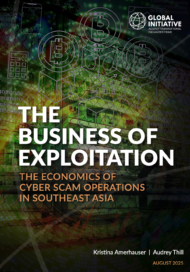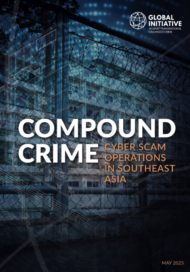Posted on 19 Aug 2025
Cyber scam operations in Southeast Asia are part of a vast and evolving illicit industry that relies on trafficking, financial fraud, corruption and professional money laundering networks. This policy brief maps the complex financial architecture behind these operations and highlights actionable policy recommendations for local, regional and global actors.
While previous research has built crucial understanding of how scammers steal and move scam proceeds, this analysis breaks new ground by mapping the broader eco-system of financial transfers that sustain these operations. The report explores payments related to online scams and fraud, worker exploitation and trafficking for forced criminality, operational expenses and corruption payments.
Money laundering in the cyber scam ecosystem is a professional, complex and multi-layered process that utilizes a range of diverse financial technologies and transfer mechanisms. At the heart are so-called ‘gateway companies’, trusted intermediaries who facilitate, insure and guarantee complex financial flows. Funds are moved through layers of mule accounts, decentralized finance (DeFi) applications, and crypto exchanges, making illicit proceeds difficult to trace.
While cryptocurrencies have become widely used by these criminal networks, the process is not limited to digital currencies alone. The report documents a diversity of payment mechanisms: cash, bank transfers, fintech apps, gaming and gambling platforms are all widely used, facilitated by regulatory loopholes and political influence. In some cases, financial platforms used by scam operations are owned by individuals with ties to political or business elites.
‘The economics of exploitation’ offers policy recommendations for governments, financial institutions, and civil society, calling for stronger regulation, enhanced cross-border and cross-sector collaboration and greater scrutiny of the digital financial infrastructure. A “follow-the-money” approach is essential to reducing the profitability of cyber scams and disrupting this rapidly evolving criminal economy.




